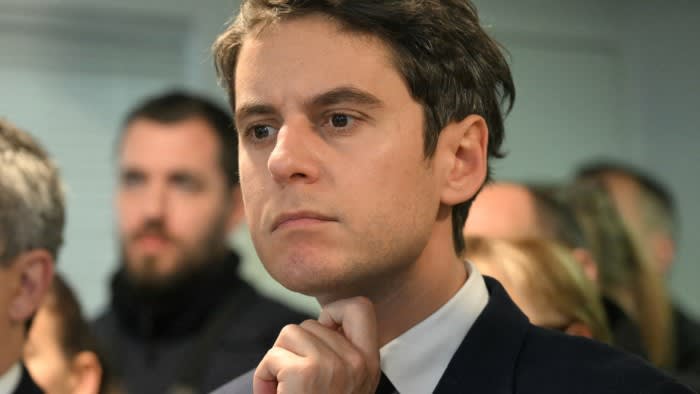Unlock the Editor’s Digest for free
Roula Khalaf, Editor of the FT, selects her favourite stories in this weekly newsletter.
Emmanuel Macron, president of France, and new Prime Minister Gabriel Attal named a smaller cabinet on Thursday that retained well-known heavyweights at four of the main ministries, including economy and finance.
The reshuffle comes only days after Macron picked Attal, his 34-year-old protégé who had been serving as education minister, to become France’s youngest prime minister. It represents a bet that Attal’s energy and popularity will reboot the president’s problem-plagued second term and blunt the rising threat of the far-right ahead of European parliamentary elections.
“I want action, action and action, and results, results and results,” said Attal on TF1 news channel, promising his team would work tirelessly to “answer the needs of the French public”.
In the reshuffle, Bruno Le Maire is to remain at Bercy, the finance ministry, which he has led since 2017, and add the energy portfolio to his remit, defying last-minute rumours that he would leave.
Interior minister Gérald Darmanin, tasked with security planning for the upcoming summer Olympics, will stay on, along with justice minister Eric Dupond-Moretti. Also remaining is the defence minister Sébastien Lecornu, a Macron loyalist who had been on the shortlist for prime minister.
The big surprise arrival was Rachida Dati, a conservative politician who was justice minster under then-president Nicolas Sarkozy. She will be culture minister.
With the new casting, Macron wants to turn the page on a difficult year marked by protests over pensions reform in spring, riots in June over a police shooting, and parliamentary battles over an immigration bill in December.
But the moves do not resolve his main problem: his centrist alliance no longer holds a parliamentary majority, making it much harder for him to advance his reform agenda of boosting the economy and repairing public services.
The reshuffle also raises the question of how much leeway the relatively untested Attal will have to shape strategy given that Macron has retained so many veterans already anchored in their ministries.
“Attal may end up being more of a conductor of the orchestra of government rather than its chief, with the big voices like the tuba, baritone, and tenor still carrying a lot of weight,” said political analyst Christophe Barbier on BFMTV.
There were some new arrivals: Stéphane Séjourné, an early Macron ally and member of the European parliament who leads the liberal Renew group, will take over at the foreign ministry for Catherine Colonna.
Catherine Vautrin, a rightwing former MP who had been at the head of a public housing agency, will lead a combined labour and health ministry, replacing Olivier Dussopt as labour minister. He had been weakened by the pensions battle last year and legal woes.
Attal said he planned to continue to lead education policy, and selected a novice in the matter, the sports minister Amélie Oudéa-Castéra, to run an enlarged education and sports ministry.
Mathieu Gallard, a pollster at Ipsos, questioned the impact of the reshuffle. “There is a certain evolution in the casting but these are not major changes and there are no big new names arriving,” he said.
“In our polling we can see that unlike in Macron’s first term, the public no longer knows where he is going or what his goals are for his remaining time in office. The new cabinet doesn’t answer that question yet.”
Macron settled scores with those fallen out of favour. Rima Abdul Malak, who annoyed Macron by saying actor Gérard Depardieu should be stripped of his Légion d’honneur over allegations of sexual harassment, was ousted to make room for Dati.
Transport minister and early ally Clément Beaune was not on the list of ministers after expressing qualms about the harshness of the immigration law.
In his traditional new year’s address, Macron promised a renewed push for a “stronger and fairer” France so as to “liberate, protect and unite” what he cast as a divided, restive society. He also coined phrases that advisers said would guide his remaining three years in office: namely delivering civic and economic “rearmament” and the “regeneration” of political ranks with new faces.
Such is the mission Macron has given to Attal, who on Tuesday promised to be bold and to quickly help the middle class cope with the rising cost of living. “I will have one goal: keep control of our destiny and liberate France’s potential,” the prime minister said.
He has enjoyed a meteoric rise in various cabinet posts, including most recently as education minister and before that as government spokesperson during the Covid-19 pandemic. He recently became the most well-liked politician in France, according to Ipsos, with an approval rating of 40 per cent compared with 27 per cent for Macron.
Attal is expected to hold his first ministerial meeting on Friday, and give a speech before parliament next week to lay out his vision and legislative road map.

Emily Foster is a globe-trotting journalist based in the UK. Her articles offer readers a global perspective on international events, exploring complex geopolitical issues and providing a nuanced view of the world’s most pressing challenges.








